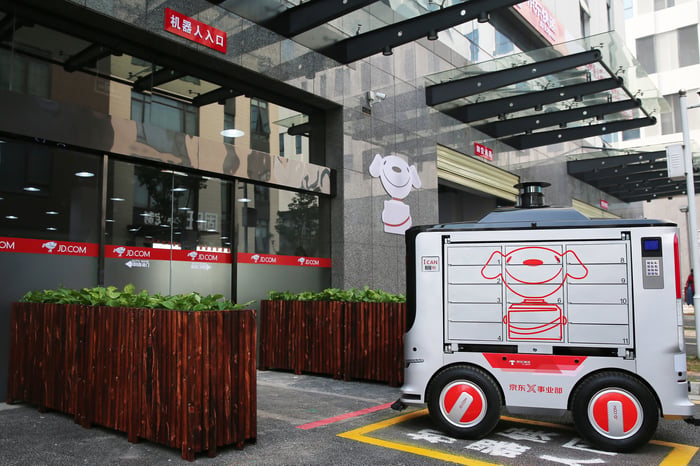JD.com (JD 2.61%), the largest direct retailer in China, went public in May 2014 at $19 per share. If you had invested $1,000 in its initial public offering (IPO), your investment would be worth nearly $4,000 today. But if you had waited four months and invested that $1,000 in Alibaba's (BABA 2.92%) IPO instead, your investment would only be worth about $2,200.
In retrospect, JD looks like a much better investment than Alibaba. However, JD's stock actually underperformed Alibaba for years before a barrage of regulatory threats nearly cut Alibaba's stock price in half over the past 12 months. Let's take a look back at JD's volatile returns over the past seven years, discuss its future plans, and see where its stock might be headed.

Image source: JD.com.
How did JD.com become China's largest retailer?
JD was founded in 1998 as a supplier of optical equipment. It launched its first online business-to-consumer (B2C) platform in 2004, and it gradually expanded its catalog with books, CDs, DVDs, and other products.
JD's number of annual active customer accounts rose from 12.5 million in 2011 to 96.6 million in 2014. That figure hit 531.9 million in its latest quarter.
JD's rapid growth was supported by rising income levels and internet penetration rates in China, the expansion of its online mall and logistics network, and its early mover's advantage in the country's e-commerce market. Unlike Alibaba, which primarily connected sellers to buyers on Taobao and Tmall without taking on any inventories, JD took on inventories and fulfilled its own orders.
Alibaba's founder Jack Ma claimed JD's capital-intensive approach would end in a "tragedy" in 2015, but JD kept growing. Its operating margins improved as economies of scale kicked in, and its first-party marketplace shielded shoppers from the low-quality and counterfeit goods which often flowed through Alibaba's marketplaces.
Alibaba reached more online shoppers in China and maintained higher margins than JD, but JD's higher revenue (from taking on inventories) made it the country's largest retailer. JD's robust growth also attracted big investments from Tencent in 2014 and Walmart in 2016.
JD gained a lot of shoppers from its shopping Mini Programs on Tencent's WeChat, China's leading messaging platform with over 1.25 billion monthly active users. It also works with Walmart to fulfill online grocery deliveries. All three companies consider Alibaba to be a common adversary.
Its stock was nearly derailed by an ugly scandal
Between fiscal 2014 and 2020, JD's annual revenue surged from 115.0 billion yuan to 745.8 billion yuan ($114.3 billion) at a compound annual growth rate (CAGR) of 36.6%. It turned profitable in 2019, and its net income more than quadrupled to 49.3 billion yuan ($7.6 billion) in 2020.
JD's growth rates drew more investors to the stock, but a rape allegation against the company's founder and CEO Richard Liu in August 2018 caused its stock price to tumble to the low $20s that December. Those charges were dropped the following summer, but the scandal highlighted just how important Liu was to the company. At the time of his arrest, Liu held an 80% voting stake in JD, and an unusual rule prohibited the company's board from making any key decisions in his absence.
Liu recently stepped away from the company's day-to-day operations and handed the reins over to Xu Lei, the CEO of JD Retail, in the newly created position of company president. Liu still maintains a majority voting stake in JD, but Xu's promotion paves the way for Liu's eventual retirement -- just as Jack Ma relinquished his CEO and executive chairman roles over the past eight years.
JD's comeback and future plans
Analysts expect JD's revenue to rise 28% this year and 23% next year as it continues to gain more users in China's lower-tier cities, broaden its selection of products, and expand its newer third-party marketplace.
JD Logistics, which went public in May in Hong Kong, will grow as it provides more third-party services to external customers. The company, which is still controlled by JD, already offers automated deliveries with driverless vehicles and drones -- and that network should keep expanding over the next few years.
JD Health, which was spun off in another Hong Kong IPO last December, could further expand JD's reach into the online healthcare and telehealth markets. Its smaller cloud and fintech divisions could also have room to grow after China cools off its regulatory crackdown on data-gathering platforms.
JD's stock hit an all-time high of $108.29 per share this February, but China's crackdown on its top tech companies knocked it back to the mid-$70s. JD's stock still looks cheap at a P/S ratio of less than one times this year's sales, but investors probably won't pay a higher premium until the regulatory headwinds wane.





